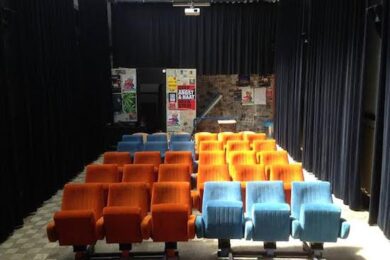A drone cinema film festival curated by Silent Record’s Kim Cascone, in a collective in Leiden on a Friday night; what – asides from the bingo and a tray pie supper – could be better? Leiden is a funny old place. Seen by many in The Netherlands as a beautiful, if very traditional university city, it has a long history of leftfield socio-musical activity, ranging back to the late 60s, with the Koppenhinksteeg squats. The Vrijplaats Middelstegracht (a renovated factory on the edge of the city centre) is one of the latest venues where the region’s underground congregate. And Vrijplaats is host to the Generator; an attic storeroom which has been transformed into a "cinema-come-performance space", specialising in all forms of drone, electronic and weirdo noise; no-beats being the prerequisite.
I’m not sure quite what exactly drone is. And certainly I don’t have much of an idea what to expect from the festival. Talking to Cascone over dinner beforehand doesn’t really reveal much either. A quiet affirmation that drone is essentially an extended space in time, and that the film programme doesn’t follow any particular theme, is as far as I get. It seems drone is a very catholic and multifaceted medium.
Up we trudge to the attic to see Nijmegen sound terrorist and one of the Godfathers of the Dutch electronic and ambient noise scenes, Frans de Waard kick off the night. De Waard is known for an uncompromising approach to sound (happily working with the most annoying of noises since the early 80s) and a relentless productivity. In that, his approach is a bit similar to Conny Plank’s. And here we get an extended and "Plankian" stream of reedy, screeching, scratchy sounds that put me in mind of a radio desperately trying to tune itself into a frequency. Watching the contrast between De Waard’s precise, benign movements (almost like a priest presiding at communion) and this concentrated noise is pretty great. But maybe we could go further into indeterminate space. Tuning into Cascones’ answers over dinner, I presume that watching De Waard’s shadow projected on the screen could open up another dimension, and I would get like La Monte Young and discover my "cosmic" self. And Frans’ shadow does start to play tricks on my mind; the space between his back and the cinema screen becoming the place where "my" drone is working itself out. My "non-cosmic" self also notes that Frans’s shadow looked like the shadowy image on the inner sleeve of Talking Heads’ ‘Fear Of Music’.
Next we are shown the films; some of which deserve mention here. The festival booklet’s text continually refers to the idea of research; with much mention in the film makers’ biographies of "thresholds", "investigations", "non-narrative states" and "altered states of consciousness". You get the feeling of simultaneously addressing inner and outer worlds, of being grounded in both the minutiae of things and witnessing bold romantic sci-fi gestures; Tarkovsky and Goethe holding hands behind the bike sheds. And Cascone’s catholic curation comes to the fore when watching the first block of films. What is interesting to note is how human and "plastic" things feel; negating any idea of academic dryness. Stand outs (for me at any rate) are Asha Tamirisa’s ‘Ox’; an intense, pulsating progression of flickering lines in what feels like a very regulated space. Coming on like a melting electrified Bridget Riley image, it really starts to fuck about with my headspace after 5 minutes or so. By complete contrast was the utter stasis of Tristan McGuire’s ‘A98point4’, a film with imagery inspired by the recent Ebola outbreak. Over a series of processed phased sounds that make me think of a dry ice machine that could make in-tune noises, McGuire’s film – which looks like a mix of an abstract watercolour and a bacterial plate – slowly melted and transmogrified into a whole range of suggestive non-images. The slowness of change is incredible and – dig this, daddy-oh – exciting.
Enervated, we pop down to the bar (cheap and unpretentious bio-beer, supermarket nuts of the more-ish variety) to chat. Shit, drone, man. In a world full of curated space, a world where we will have to curate ourselves soon (when we start having to fucking wear microchipped underpants, DDR style), drone offers an indeterminate space where we can escape and reclaim a bit of human space, of feeling and of peace. Bloody hell.
Two more films follow; a brilliant choreography called ‘[*]n Scape’ by Michal Seta that puts me in mind of a slowly changing Manga film set and the bravura, Byronic and very "1940s filmic" sweep of ‘Lit- a composition of real time video and light for deceleration’, by Alexander Wendt; with a "chance composition" by Robert Curgenven.
By the end of the latter, the Generator’s collective head is on the point of self-combustion. A salve comes in the form of the night’s closing act, composer Martijn Comes, whose beautiful "Andriessen-goes-pop" deconstruction of sound is an exhilarating ending. Imagine side 2 of Bowie’s Low playing as an old Mazda goes to the crusher, being smashed up and reconstructed as a cube of steel before being beaten out as the finest wibbly-wobbliest bit of sheet metal ever to be stuck on a beautiful heiress’ bathroom wall. Comes, shaking like a leaf at the end – probably from the weight of carrying such a sound in his head – looks up, snaps his laptop shut, and walks off; swallowed up in the dark. We droneheads flop back, sated.
<div class="fb-comments" data-href="http://thequietus.com/articles/17594-festival-report-drone-cinema” data-width="550">



